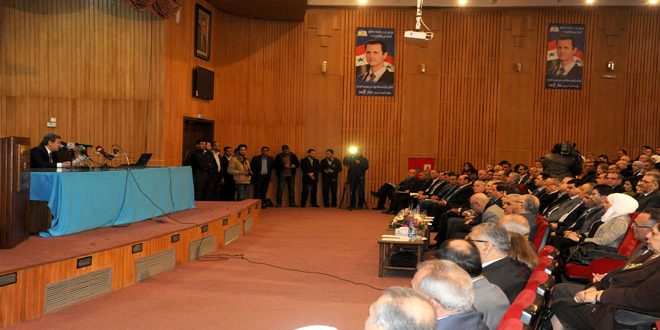Damascus, (ST) – Ministry of Economy and Foreign Trade held yesterday a seminar on “Participatory Law No. 5 of 2016 and its executive instructions on the available participatory contracts between public and private sectors, particularly in the field of infrastructure, services and workers’ rights within the project which will be held according to the law and the need to re restructuring of some public sectors to be able to evolve in parallel with the private sector in the next participatory projects.
In a speech during the seminar held in the Faculty of Civil Engineering at the University of Damascus, Minister of Economy and Foreign Trade, Dr. Adib Mayala affirmed the government’s keenness on finding formulas for activation of work and stimulate economic activity, supporting projects, increase job opportunities and achieve greater efficiencies for the use of government capital through the activation of participatory between public and private sectors in accordance with specific legislative framework.
The minister stressed that participatory “does not mean in any way the privatization of public property, but the creation of channels to redirect government investment expenditure and pumping into the development of investment projects,” noting that the Participatory Law will create, “a quantum leap in the field of investment in Syria being simulates transparency and credibility in the forms of contract provided for “in addition to the advantages contained to the two sectors which are in the interest of the national economy.
The minister said that” participatory Law is one of the leading laws that promote investment and ensure sufficient flexibility and incentives to the private sector, which is a real partner contributed to the protection of the national economy and will contribute to the reconstruction and the promotion of the development process,” pointing out that the instructions of the law provides for having a strategic partner who has the potential required from the private sector views in accordance with the participatory formats including contributing to the transfer of technical know-how to the public sector.
The Chairman of Planning and International Cooperation Authority, Dr. Imad Sabouni a detailed presentation on the general concepts and methods of contracting within a participatory law and obligations of partnership between the public and private sectors due to the large expansion in the types of services and public utilities and the need for the contribution to the private sector in this field and the contracts offered by the partnership projects, both in terms of service or operating or managemen,, conversion and acquisitions and the challenges that might hinder the implementation of projects, particularly high costs or disputes that may occur in addition to the controls regulatory and institutional framework to them.
He explained that the partnership includes carrying the private sector, “a significant risk” in finance, management and operation does not mean that “this sector, a resource for the public sector or the contractor has, but do joint investments within the contractual relationship aims to provide a public service,” adding that the partnership between the public and private sectors is an essential part from “investment and development strategies.”
Director of the Development and Investment Advisory Office in Damascus, Dr. Nabil Sukkar, felt that the private sector bears “significant risk” according to the law and get the incentive features of the entry process, service and productivity, pointing to the industrial cities projects and social housing that should be taken into consideration by investment and real estate development or participatory law in the next stages.
The seminar was attended by ministers of social affairs, tourism, labor, financial and representatives of the Federation of Agriculture, Trade and Industry chambers and economic in addition to a crowd of interested parties.
Sh. Kh.

